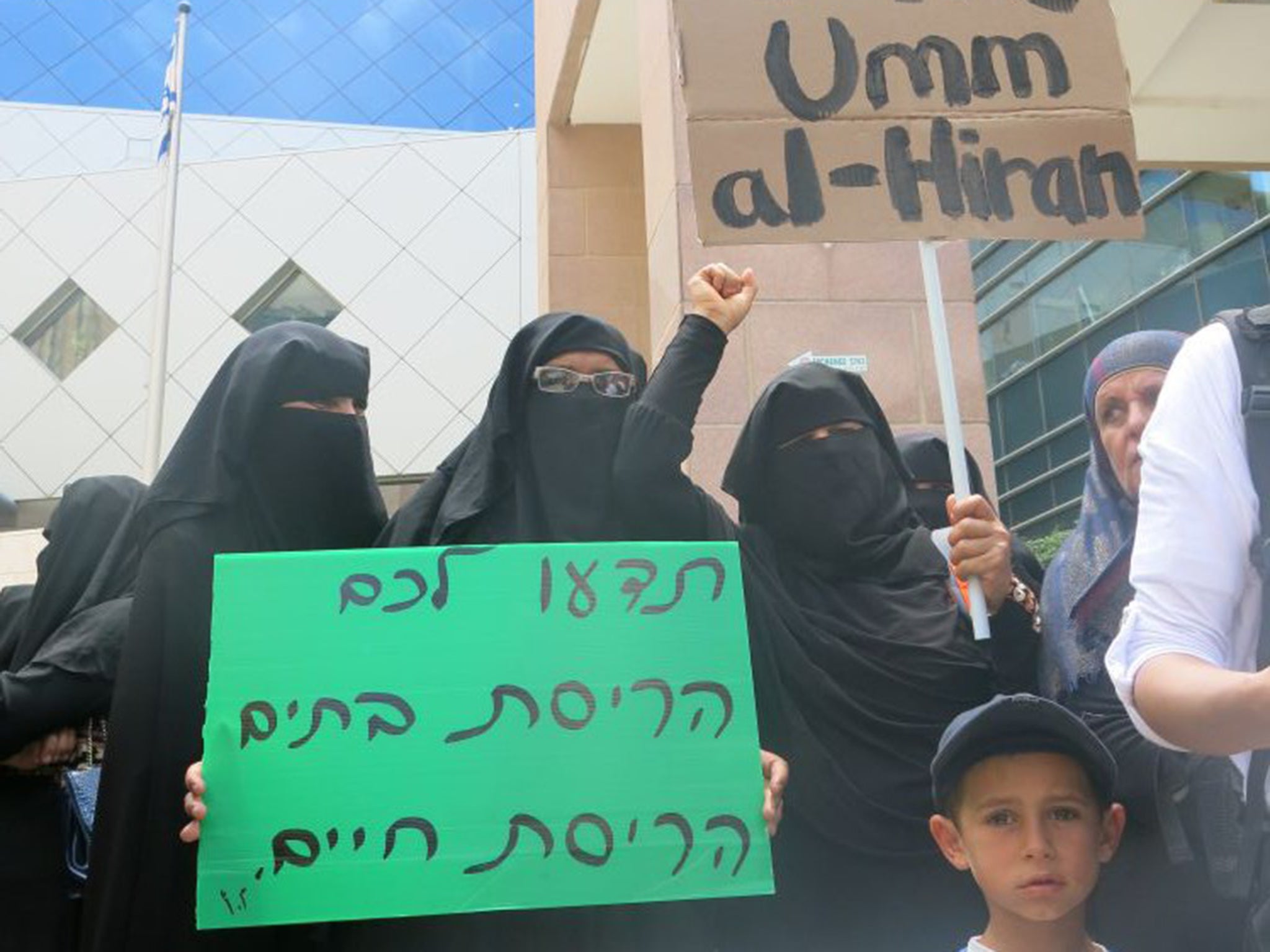Israel's Bedouin refuse to go quietly as state attempts to oust Umm al-Hiran villagers
The community have lived on the modest desert site since 1956

There’s no sign announcing the dusty entrance to Umm al-Hiran: no electricity wires or properly paved roads. But for some 400 Bedouins, this modest village in the southern Israeli desert has been home for nearly 60 years. And as they wait to hear the outcome of a last-ditch legal attempt to prevent the state from ousting them to make way for a new Jewish town, they have become the focal point in a debate about Israel’s treatment of its Bedouin citizens.
A few hours after a protest about the village’s plight, Raed Abu al-Qian – a member of a committee fighting eviction – holds court under the shade of a tent hitched to the side of the local mosque. Strong family connections are important in the village, and it shows – an elderly man in white robes turns up with coffee and several young children gather round.
Mr Qian is undeterred by recent setbacks. Last month, Israel’s Supreme Court decided in favour of the state’s planned expulsion, finding that although in 1956 the military installed the villagers on the land where they now sit, they can be moved for new construction. The village’s lawyers have filed an extraordinary appeal for a larger panel to hear their case; they’ll hear back within 10 days.
“We’re talking about a hunger strike now,” says Mr Qian. And if the bulldozers eventually come, locals won’t roll out the red carpet: “If the state wants to demolish my house, it can kill me with it.”
Israel’s Bedouin number a little more than 2 per cent of the country’s population. Most, around 200,000, are in Israel’s southern Negev desert. As Israeli citizens, they have the right to vote and hold Israeli passports.
Around half live in small villages most of which, including Umm al-Hiran, are considered illegal by the state because they lack proper planning permission. This leaves them off the power grid, unconnected to waterlines, and without basic services such as health clinics and schools. High rates of poverty and unemployment are common across Bedouin populations.
A plan to move these people into state-planned towns – the government said it would boost access to education and other much-needed amenities – was shelved in 2013 in the face of large protests. Now many of Israel’s Bedouin – associated in the popular imagination with a nomadic lifestyle – are trying desperately to stay put.
For more than a decade, Umm al-Hiran’s small piece of desert has been one of several places in the region earmarked for development. So far, all the intended residents of the town meant for this plot – also called Hiran – are Jewish.
Mr Qian sees this is an example of state-sponsored discrimination. “The country’s policy is not to demolish our homes, but our legacy and faith,” he says.
Mysanna Morany, an attorney at the NGO Adalah – the Legal Center for Arab Minority Rights in Israel, represents Umm al-Hiran. She is concerned that the court’s decision sets a troubling precedent: “It means all the unrecognised villages can be evacuated.”
The Bedouins and their supporters are ramping up a publicity campaign. Haia Noach, CEO of the Negev Coexistence Forum for Civil Equality – a joint Arab-Jewish group – is among the Jewish Israelis working closely with those in Umm al-Hiran. They bring groups of Israelis to the unrecognised villages to enhance awareness of the situation.
Ms Noach, herself a native of the Negev desert, believes the government’s policy towards the Bedouin is failing. “It is not sustainable. You have to create some sort of equality … unless you want people to live in bubbles.”
Mr Qian sees this as a struggle to maintain tradition. “We are bonded to this place and we have a legacy of communal life,” the father of seven explains, as he encourages a youngster to pepper the sand with water to cool it down. They herd goats, and raise chickens and other animals.
The government has offered relocation for the villagers to a nearby Bedouin town called Houra, which is recognised by the state and so has some of the corresponding niceties.
Liad Avner, a spokesman for a government division for Bedouin affairs, says they have reserved a neighbourhood for the family, and they are ready to accommodate their needs. “When we start talking and not fighting, everything will be much easier,” he says.
For some Bedouin, such as Sanaa Abu al-Qian, 23, the move is a good opportunity. She grew up in a Bedouin city, married into the village, and finds its remote location difficult – it can take her four hours to get to university because no buses pass by.
But Mr Qian and most of the village have no interest in moving or in compromise. “[The new town] has some electricity and street lights … but I’m not tempted. We want a dignified life, not a comfortable life.”
Subscribe to Independent Premium to bookmark this article
Want to bookmark your favourite articles and stories to read or reference later? Start your Independent Premium subscription today.

Join our commenting forum
Join thought-provoking conversations, follow other Independent readers and see their replies